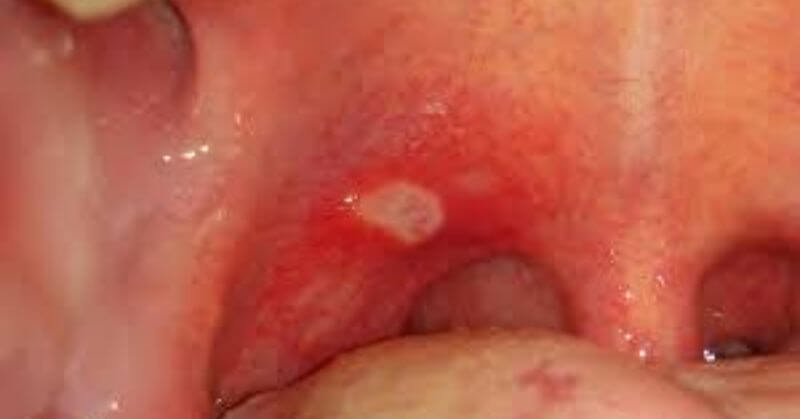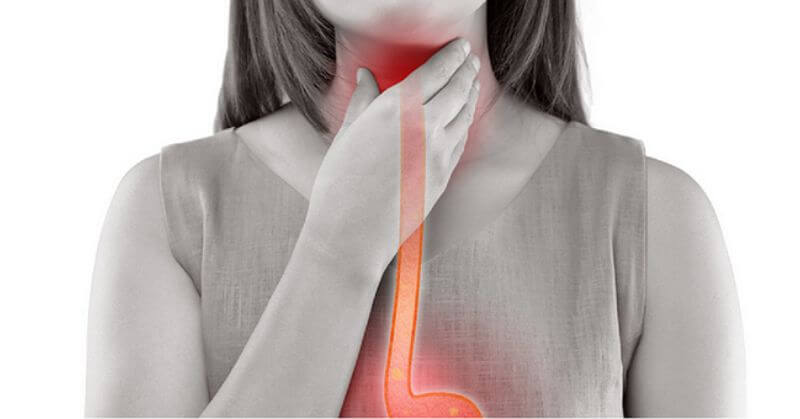What is a canker sore? A canker sore is an ulcer sore that develops in the mouth or throat. It usually appears on the inside of the cheek, lips, and under the tongue. But in a rare case, it affects the back of the throat or on tonsils known as canker sore back of throat. They can also be called mouth ulcers or throat ulcers or aphthous ulcers or ulcers on tonsils. It appears like a sore throat with a white or yellowish center that outlines with a reddish border. Canker sores are painful and discomforting feelings while swallowing and speaking. Sometimes you may also experience other symptoms associated with canker sores, including fever, swollen lymph nodes, and sickness.
The best part is that it heals on its own within 1 to 3 weeks. It is not contagious. It does not require special treatment, with simple home remedies or without can heal. If the sores are severe, it may take up to 6 weeks to heal.
3 Types Of Canker Sores
Canker sores are of three types. They are minor, major canker sores, and herpetiform canker sores. The symptoms of canker sores vary based on the types in their size, severity, and other symptoms. The common symptoms with all types of canker sores are different sizes of bumps inside the mouth, and pain while eating, speaking, or drinking.
Minor canker sores
It is the most common type and is smaller in size comparing the major type. It can heal on its own within 1 to 3 weeks without leaving any scar. The symptoms of minor canker sores include painful millimeters-sized sores that give a tingling or burning sensation.
Major canker sores
Major canker sores are larger in size and pain is more severe than minor canker sores. They may take up to 4 weeks to heal. Here the chance for scarring is higher. When talking about the symptoms the sores are larger which can cause severe pain. They can give burning or inflammation sensation with difficulty in eating, speaking, and drinking.
Herpetiform canker sores
Herpetiform canker sores are a very rare case that only can affect 5% of people. The clusters of tiny sores can occur in this case and cause pain when there is movement in the mouth muscles. These sores also cause a burning or tingling sensation. The risk of scarring is higher when comparing minor and major canker sores.
Canker Sores In Back Of Throat
We know that canker sores can develop in the mouth or throat. Here we are going to see if canker sores develop at the back of the throat, and what are the causes, symptoms, and treatments. The throat consists of three parts. They are the nasopharynx, oropharynx, and hypopharynx. The tonsils also sit at the back of the throat. The back of the throat can have canker sores if the tonsils get infected or canker sores develop on the tonsils.
Symptoms of canker sores in the back of the throat include;
- Severe and painful sore on the tonsils and canker sore on one of the tonsils cause sore throat.
- One or two days before, it may give the tingling or burning feeling in the area where the sore may develop.
- The well-developed sore may give a stinging and irritable sensation when you put something into your mouth to eat or drink that is acidic.
It is different from strep throat or tonsillitis. When the tonsillar tissue gets infected by a bacterial or viral organism, it develops tonsillitis. It possesses symptoms like sore throat, fever, difficulty in swallowing, loss of voice, ear pain, and throat tenderness. But in canker sores on tonsils, a single small sore develops.
Throat ulcers pictures

11 Major Canker Sores Causes
There is no clear and confident information about the cause of canker sores. There is a possibility of canker sores if their families have a history of canker sores. And other possibilities of causes or the things that can trigger the canker sores are;
- Food sensitivities to acidic or spicy foods or other allergic foods
- Stress and hormonal changes
- Mouth or throat injuries
- Viral and bacterial infection in the mouth
- Sodium lauryl sulfate in mouthwashes and toothpaste
- Deficiency in nutrition such as iron, zinc, or vitamin B-12
- Weakened immune system
- Inflammatory bowel diseases
- Celiac disease
- Behcet’s disease
- HIV and AIDS
A canker sore can develop in anyone, but teens and young adults are highly prone to this.
Canker sore back of throat treatment
Usually, the canker sores heal on their own without treatments within a few weeks maximum of 6 weeks. Despite severity, you can heal the canker sores with OTC medications or home remedies. The severe canker sores can last for 2 to 3 weeks and cause scarring.
Medical Treatments
What are the OTC medications you can take to treat the canker sores? Generally, medications are helpful in relieving pain, reducing swelling, and speeding up the healing process.
- Medications with anti-inflammatory or pain relieving properties are highly helpful in curing the sores. Anti-inflammatory drugs like ibuprofen can give to reduce pain and inflammation.
- Mouthwash is the best way to treat the canker sore in the unreachable throat area. It can reduce the pain, swelling, and risk of infection. Mouthwashes containing menthol or hydrogen peroxide are the best product for gargling.
- Mouth sprays containing benzocaine or phenol are also helpful in healing the canker sores.
- In severe cases, it is good to consult a doctor who can prescribe appropriate medication like a steroid mouth to heal the sores.
- Avoid or limit spicy foods until it gets treated completely.
You discuss this with your doctor before giving any OTC medication to children. Not all OTC mouth sprays are safe for children.
Top 10 Home Remedies
Since the canker sores are inside the mouth, the only way possible you can support the healing process is by gargling and avoiding certain spicy and acidic foods.
- Rinse your mouth up to three times daily with warm water mixed with a teaspoon of salt or baking soda.
- Apply milk of magnesia on the spot using a soft cotton swab. It can do for several times a day.
- Gargle with cold water to relieve pain
- Apply the paste made of alum powder to the sore and rinse your mouth after one or two minutes. It helps in shrinking tissues and drying out canker sores.
- Eating a cup of yogurt daily can prevent or treat a canker sore.
- You can apply honey to the sore up to four times daily. It has anti-bacterial and anti-inflammatory properties. It can help in reducing the size, pain, and redness of the sore.
- The antimicrobial properties in coconut oil can help in treating the canker sore. So, gently apply coconut oil to the sore. The anti-inflammatory properties in that can help reduce pain and redness.
- Watermelon frost is also one of the effective remedies for canker sores. You can apply it directly to the sore. It improves the healing process.
- Zinc and vitamin b12 deficiency can cause canker sores more often. Adding these two to the diet either by supplement or foods can prevent or treat canker sores.
In addition to these remedies, as said before, avoid spicy foods and sharp-edged foods to prevent irritation and inflammation.
Conclusion
Canker sores can come to anyone, but the real cause of canker sores is unknown. It believes that certain foods, medical conditions, injuries, and infections can cause canker sores in the mouth or throat. At the back of the throat, the tonsil sits, if it gets affected by a sore, you may have a canker sore in the back of the throat. Usually, canker sores heal on their own as the days go on. It may take up to 6 weeks based on the severity. You take try home remedies or OTC medication to promote the healing process. It is advisable to visit a doctor if the canker sore persists for long days.
Also Read: How Can I Treat Baby Neck Yeast Infection?
Follow Us: Facebook | Instagram | Twitter | Youtube | Pinterest
Tinydale is on YouTube, Click here to subscribe for the latest videos and updates.

